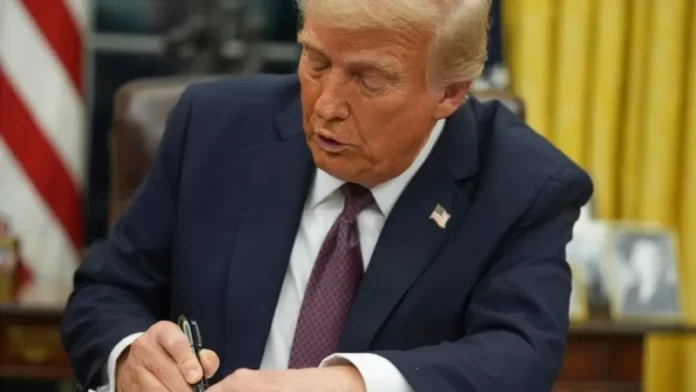Washington, D.C. – President Donald Trump has taken his fight over birthright citizenship to the Supreme Court, as his administration seeks to narrow the scope of judicial blocks imposed on his attempt to restrict automatic U.S. citizenship for children born in the country. The Justice Department has requested the court to limit the injunctions issued by federal courts in Washington state, Massachusetts, and Maryland to only apply to the plaintiffs involved in the cases.
In a filing, the Justice Department stated that “universal injunctions have reached epidemic proportions since the start of the current administration” and urged the court to declare that “enough is enough” before district courts’ reliance on universal injunctions becomes further entrenched.
Trump’s executive order, signed on his first day back in office on January 20th, directed federal agencies to deny citizenship to children born in the U.S. if neither parent is an American citizen or lawful permanent resident. However, the order has been blocked nationwide by multiple federal judges.
The order has faced legal challenges from various plaintiffs, including 22 Democratic state attorneys general, immigrant rights advocates, and expectant mothers. They argue that Trump’s order violates the 14th Amendment of the U.S. Constitution, which guarantees citizenship to anyone born in the United States.
The 14th Amendment’s citizenship clause states that “all persons born or naturalized in the United States, and subject to the jurisdiction thereof, are citizens of the United States and of the state wherein they reside.” However, the administration argues that this clause does not extend to immigrants who are in the country illegally or those with temporary lawful status, such as university students or those on work visas.
This is not the first time the Trump administration has sought the Supreme Court’s intervention to defend its actions. With a 6-3 conservative majority, including three justices appointed by Trump, the administration is hopeful that the court will rule in their favor.
Trump’s push to restrict birthright citizenship is part of a larger crackdown on immigration and border security, which also includes involving the U.S. military in border protection and implementing a broad ban on asylum.
The judges who have ruled against Trump’s order have cited the 1898 U.S. Supreme Court case, United States v. Wong Kim Ark, which guarantees citizenship to children born in the U.S. to noncitizen parents. However, the Justice Department argues that the court’s ruling in that case was narrower and only applied to children whose parents had a “permanent domicile and residence in the United States.”
The battle over birthright citizenship is just one aspect of Trump’s hardline approach towards immigration. However, it has sparked intense debate and legal challenges, with critics arguing that it goes against the fundamental principles of the United States as a nation of immigrants.
While the legal battle continues, it is important to remember that the United States was built on the idea of welcoming and embracing diversity. The 14th Amendment was created to ensure that all individuals, regardless of their background or status, are granted equal rights and opportunities as citizens of this great nation.
As the Supreme Court considers the administration’s request, it is crucial to remember that birthright citizenship is not just a legal issue, but a moral one as well. The United States has always been a beacon of hope and opportunity for those seeking a better life, and birthright citizenship is a vital part of that legacy.
In the end, it is up to the Supreme Court to decide the fate of Trump’s attempt to restrict birthright citizenship. However, as Americans, we must continue to uphold the values and principles that have made our country a symbol of freedom and diversity. Let us hope that the court’s decision will reflect these values and ensure that birthright citizenship remains a fundamental right for all individuals born in the United States.

